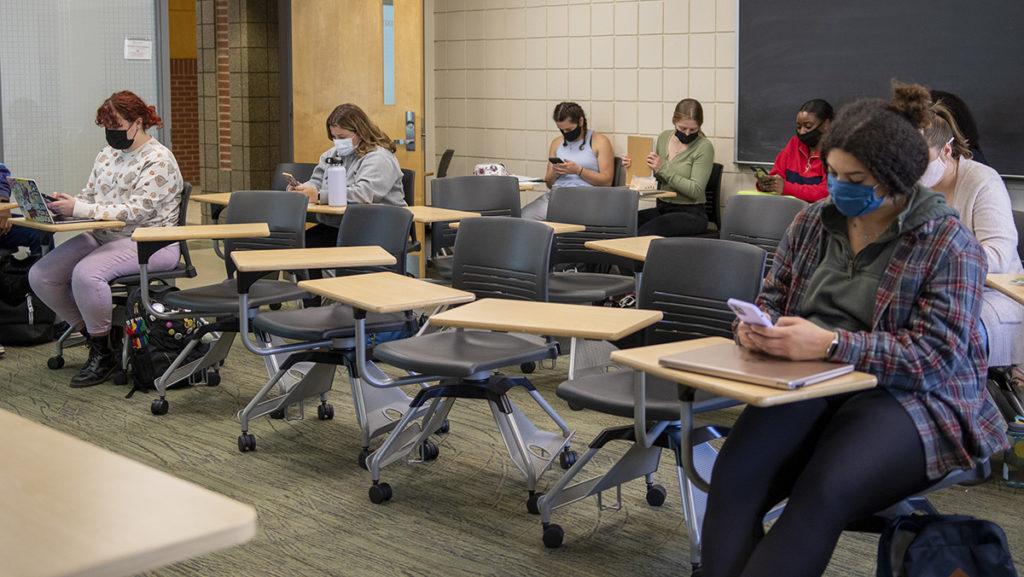Ongoing positive cases of COVID-19 are not only a health concern for Ithaca College students and faculty, but also an academic concern due to how self-isolation is impacting students’ ability to attend and keep up with in-person classes.
Fall 2020 classes were held completely remotely and changed to a hybrid format for Spring 2021. Some classes are still online for Fall 2021, but the majority have shifted to in person. While there is no vaccine mandate for faculty and staff, students are required to be vaccinated. The college is reporting over a 99% vaccination status rate for students and a 78% vaccination rate for faculty and staff. Other safety guidelines include an indoor mask policy and randomized surveillance testing, which was implemented Sept. 13.
Jessye Cohen-Filipic, associate professor in the Department of Psychology, said students have asked her to resume hybrid learning. She said she understands the anxiety behind that request, but feels like it is not her call to make because the college is committed to in-person learning. Cohen-Filipic said attendance in her classes has plummeted in the last week because of what she thinks is from sickness or fear of sickness. She said there is a lot of second guessing herself about what the right thing to do is.
“My real frustration would be if people are being penalized for missing class when they are legitimately sick or waiting to be tested or [have been] exposed,” Cohen-Filipic said. “That really defeats the purpose of what we’re trying to do from a community perspective. So that may be something we should have more campus conversations about.”
In previous years, the college’s attendance policy states that students must attend all classes and are responsible for any missed work. It also states that professors are expected to provide guidelines for any penalties that will occur from unexcused absences and while they may vary, all guidelines incorporate federal and state laws about certain accommodations.
Interim Provost Melanie Stein said the attendance policy has not changed from previous years, but if the daily COVID-19 screening for students and faculty shows they should temporarily isolate, it will be accommodated.
“Students who must be absent from class should work directly with their faculty members to stay informed about coursework,” Stein said via email. “In the unlikely event a significant portion of a class must be absent due to isolation or quarantine, the college has established some guidance for faculty members about adjustments they may wish to make, and they can also be in dialogue with their chairs and deans for support.”
Freshman Emma Belsky said she was sick and absent from classes Sept. 13 to 17. She said she missed a hands-on learning opportunity in her cinema production class on how to operate a film camera. Belsky said now she has to make her own movie and does not know how to.
“I was afraid of missing classes so after I got my negative [COVID-19] test results back I went to class even though I had a viral infection and was on antibiotics,” Belsky said.
Senior Margaret Flynn said none of her classes provided extra online materials when she was absent for two days earlier this semester. Flynn said it is not clear if her illness-related absences count towards her classes’ alloted excused absences. She said faculty members have told students to stay home when sick, but also said that if she misses classes, she will probably fail.
“If I got COVID that would be an issue for me,” Flynn said. “I am taking 17 credits this semester and also working three jobs. Having to catch up on all of that and not having an income would be a huge problem.”
The college currently has four active student cases of COVID-19 accounting for three residential student cases and one off-campus student case. Tompkins County reported 227 active COVID-19 cases Sept. 25 and 46 new positive cases. The recent rise in new cases are attributed to the delta variant as well as college students returning for the fall semester.
Sergio Pedro, assistant professor in the Department of World Languages, Literatures and Cultures, said figuring out how to help students through this time may be difficult, especially when teaching language courses.
“I would have to do something because there is no way a student could get through a language course missing two weeks of class,” Pedro said.
Derek Adams, associate professor in the Department of Literatures in English, said he has heard from students that some faculty are not accommodating absences from class and students are being left behind.
Adams said the idea is not to create a domino effect where everyone reverts back to online learning or for students who have paid for a residential experience being forced off campus. He also said generally the communication between the administration and faculty has been clear, but that there have been inconsistencies with the communication about having classes online.
“They have said not to do Zoom classes or Zoom recordings,” Adams said. “We were told it was possible, but only if we were experiencing COVID-19 symptoms, not if our students were. That was something I guess I just didn’t hear correctly when it was told to me.”
Freshman Simon Ricciardi said he was absent from his classes Aug. 31, Sept. 2 and 7 due to illness as well as waiting on his COVID-19 test results. He said he feels conflicted about the way the college has started in-person classes back up and doesn’t know how to stay safe while also learning.
“I think that it is unfortunate when they advocate for you to stay home but there is no way to stay home and get your work done,” Ricciardi said. “If I did have COVID-19 and had to be in quarantine for two weeks, I can’t imagine where I’d be at. For my two classes where nothing is online, that’s two classes where I would ultimately fail.”








